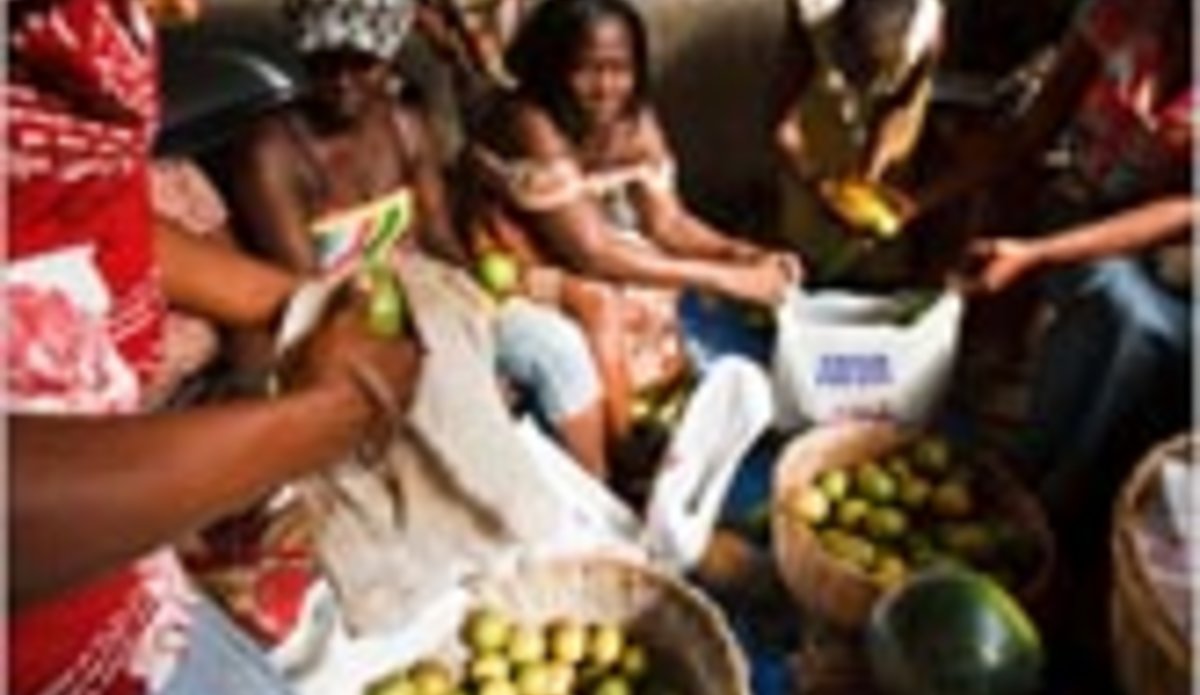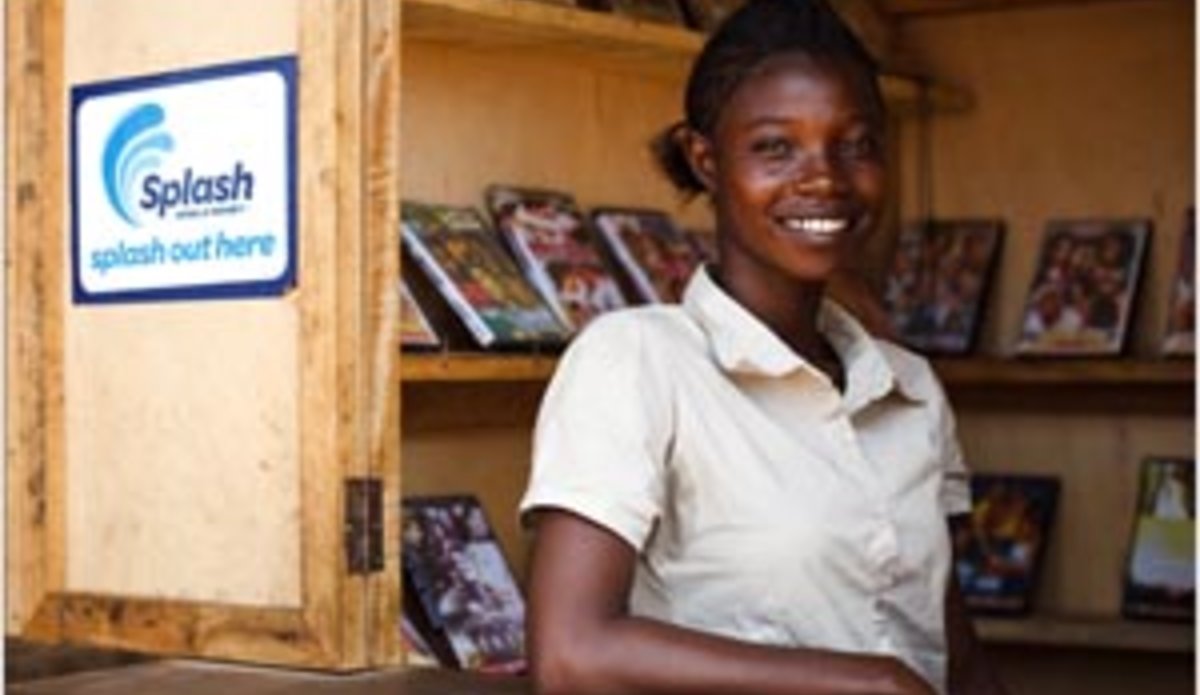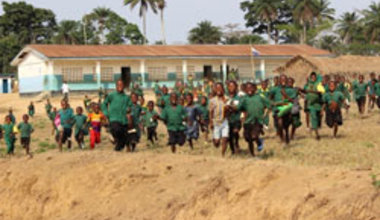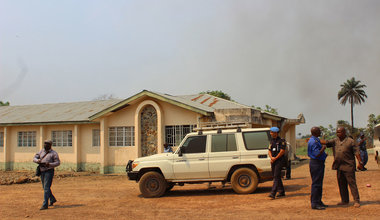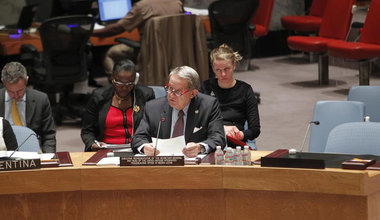Getting Youth On the Road To Success
Sierra Leone has the world's highest youth unemployment rate. Over 60 per cent of young people are unemployed, underemployed or in the informal economy. Integrating them into the economy requires innovative, large-scale and long-lasting solutions, with interventions especially needed in rural areas. Many new opportunities are being created through United Nations Joint Vision programmes, with some 10,300 young people involved. This feature story highlights the programmes' potential to transform their lives. A clear success story, it shows how, as individuals, they have experienced an average income increase of over 197 per cent, their food security has improved, and many more are attending school.
"Sierra Leone cannot develop without its
young people being involved - and their
thoughts being taken seriously."
Ibrahim Jalloh, District Youth Leader
Feature story
It's a hot and dusty Thursday morning on Aberdeen Road in the western part of Freetown, Sierra Leone's capital, and Halima Kamara, 23, has just opened up her small street-side kiosk. Six months ago a lot changed when she got the kiosk as part of a UNDP-sponsored project aimed at employing and empowering youth.
Youth unemployment a record high
Remembering how it was before, Halima describes the difficulties of life for a youth in the capital, "I never had any food, did not have a job, was not able to go to school and was dependent on my relatives... I was miserable," she says looking down at her hands. The situation she described is not uncommon in a country with the highest youth unemployment rate in the world, with very low human capital, and where almost half of young people are illiterate. Lack of money had forced Halima to leave the business school she had been attending; the only work she found was at her aunt's house. She explains her change of fortune,
"My sister told me about the UN project. I applied with my business plan and was granted the training." Through the help of the International Rescue Committee (IRC), an NGO working in collaboration with UNDP, she has been able to start up her business.
Gaining skills for a viable future
First she gained her skills in business development, customer care and budgeting. A grant followed which enabled her to start out with a stall in Aberdeen. Today Halima has a micro-franchise, a mobile financial service which gives her a commission based on sales. In addition, she rents out video films. Business is picking up. "I am now able to pay the fees to go back to college," she says. Halima's new prosperity also allows her to fund the schooling of her siblings, a sister 12, and brother, 11. "I love being an entrepreneur," she says. "People respect me now. I have my own salary and many regular customers; and I have done it all on my own."
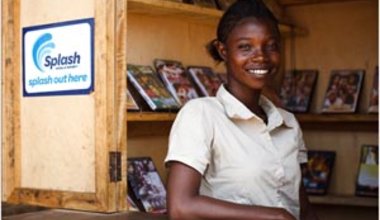
After her change of fortune Halima Kamara is confidently running her franchise businesses, including video rental, from the kiosk she got with the help of NGO International Rescue Committee (IRC).
|
Networking and mutual help
An important part of the project is the network created by the youth involved, a group of about 20 young microfranchisers. They meet every month to discuss their business problems and possible solutions. Each contributes a small amount to a savings pool used to help out members having financial difficulties. "We take care of each other," Halima says. Halima's plan is for her brother to work at the kiosk while she's getting her business diploma. "I am teaching him how to run it - but it is still my shop!" she says, laughing. "I can now take care of my wants and needs, and it feels good. I am very grateful."
Shifting from supply- to demand-driven
About 400 youth, in four different districts of the country, have gone through the same training as Halima. Other UNrun labour-intensive projects, managed by ILO throughout Sierra Leone, are targetting over 10,000 youth with many gaining skills in construction and road-building. The aim is to shift from supply- to demand-driven support for youth employment. With the current programmes the UN is working to foster an environment where skills training is directly linked to labour market demands.
"Take young people's thoughts seriously"
In Makeni, Ibrahim Jalloh, the Bombali District Youth Leader, is addressing a youth meeting of representatives from 10 regional youth organizations. He emphasises the importance of investing in youth and stresses the role the community has to play, saying, "They, the entire community, must take young people's thoughts seriously. They cannot get Sierra Leone to develop without us."
Finally, recognition....
Jalloh is very positive about the focus on Sierra Leone's young people by the United Nations Joint Vision programmes and the Government's Agenda for Change. "We are finally being recognized. I notice efforts all over the country. I am looking forward to seeing it all coming together." "Youth must take part in all decision-making for change to happen. We are part of the solution - the problem-solvers, not the problem makers," Jalloh says. "Many challenges remain but Sierra Leone's youth have a bright future ahead."
...................................................................................
Photo: UNICEF/Olivier Asselin - Youth taking care of one another: through the network established among young franchisers they find mutual support from meeting to seek solutions to the problems they are experiencing in setting up their businesses.
Text: Therese Leijon
 UN
UN
